Dec 10, 2015 | 16 Days Activism Against Gender Violence, Events, Immigrant Women, Indigenous Women, Missing Murdered Indigenous Women and Girls
International Human Rights Day
Resisting the Backlash Against Women’s Human Rights
by Ela Esra Gunad
December 10th is International Human Rights Day, a day to bring attention to the fundamental proposition in the Universal Declaration that states each one of us, everywhere, at all times is entitled to the full range of human rights which belong equally to each of us and bind us together as a global community with the same ideals and values. It was sixty-six years ago that this milestone document in the history of human rights, The Universal Declaration of Human Rights (UDHR), was adopted.
Where are we as a global community at today in terms of the rights of women?
Every day, all over the world, women and girls continue to face violence and abuse in their homes, schools, workplaces, online, and on the streets. Globally one in three women has experienced abuse or subjected to gender-based violence in their lives. Here in Canada, every six days a woman is killed by her intimate partner. Women are facing this violence simply because they are women. There are currently 1,181 missing and murdered Indigenous women and girls throughout Canada due to the historical and present day systemic and social oppressive forces.
Throughout history and still today, there has been an ongoing battle on women’s bodies during times of conflict and war. In Rwanda, between 100,000 and 250,000 women were raped during the three months of Rwandan Genocide in 1994. According to the UN agencies, more than 60,000 women were raped during the civil war in Sierra Leone (1991-2002), more than 40,000 in Liberia (1989-2003), up to 60,000 in the former Yugoslavia (1992-1995), and at least 200,000 in the Democratic Republic of the Congo since 1998. And, the history repeats itself today from Egypt, Afghanistan, and Iraq to Syria. Even in the absence of conflict or war, being a woman in these regions is being on continual alert of being harmed or killed. It cannot be ignored that during waves of militarization threaten women’s lives all the more. Women have been arbitrarily arrested and detained, physically abused, harassed, and tortured in ways you may not even want to imagine.
Living free from violence is a human right, yet millions of women and girls face this violence both in times of peace and in war, at the hands of the state, in the home, and in the community. A vast number of women experience forced migration and have to leave their homelands in order to escape gendered systemic violence including gender oppression, gender persecution, political persecution, femicide, war, economic violence, land theft, and the impacts of colonization and globalization. We know through our support and advocacy work at Battered Women’s Support Services, migrant women have always faced structural barriers and there are many inequalities that migrant women face within Canada’s economic, social, legal, and political systems. It is crucial to understand that human rights are linked to each other and these inequalities often deny the basic rights of migrant women and their families. Freedom of movement and residence within any country is a human right, yet migrant women’s lives continue to be threatened by unsafe alternatives that force them to flee their countries, and once they make it into Canada the immigration process makes them even more vulnerable to further violence by the state, by employers, and within their relationships.
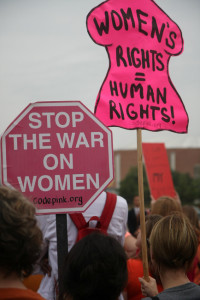
Violence is one of the most common causes of homelessness for women and children. Our work on homelessness and violence against women shows that women leave their homes because of physical and/or sexual violence. On any given day in Canada, over 8,200 women and children are living in emergency shelters and transition houses to escape violent partners. Every woman and her children are entitled to safe, affordable, and adequate housing, yet many women face homelessness and/or further violence as a result of that. BWSS works very hard to get women into social housing and we know the demand supersedes the available resources. One women’s shelter reported turning away eight to ten women per day at both of the shelters it operates. At BWSS we know many women with children will do almost anything to avoid sleeping on the streets out of fear of losing their children. With no place to go and not wanting to lose their children, many women stay in the abusive relationship.
This reality will not change until we each own our role in ending violence and do what is in our power to advocate and act ( activism ) to end gender-based violence. Women around the globe are rising against the pandemic of gender based violence, standing in their power, mobilizing and organizing to end all forms of violence against women and girls. From Indigenous women warriors’ who took to social media with #IAmNotNext campaign to women survivors who are standing in their power and coming forward with #WhyIStayed, #WhyILeft, and #WhyIChooseNowtoTellMyStory hashtags; from women of the Arab Spring who carried their voices far and wide on the winds of revolution to women in Nigeria who started #BringBackOurGirls campaign to demand the return of hundreds of kidnapped Nigerian girls.
As it has been said, ending violence against women and girls remains one of the most crucial social issue to be obtained, since it weakens all other efforts towards a future just society. To come to grips with today’s most prevalent human rights violations in world, we have to work together towards a world in which women are safe and free everywhere from their very own intimate environments to the wider world at all times.
In the past 35 years, BWSS has been working on this frontline to end violence against women and making a positive change in the lives of girls, women, families, and communities.
On this International Human Rights Day, we ask you to take an effective action to stop violence against women. We need you to create a future free from violence for all.
Use your power today to end violence against women by:
Read more about our 16 Days of Activism Against Gender-based Violence campaign:
International Day to End Violence Against Women in Canada
Culture Shifts Recognized as Women’s Group Commemorates 35 years of Work to End Violence Against Women
Women’s Leadership for One Future Without Violence
The Dynamics of Power and Control After Separation in Relation to the Family Law Processes
16 Steps for Discovery and Empowerment
Decolonizing and Healing Through Ceremonies
The Power of Support Groups at BWSS
Volunteering on BWSS Crisis and Intake Line
Wildflower Women of Turtle Island Drum Group
A Space for Every Woman to Grow
If you could do something to end violence against girls and women, wouldn’t you?

Apr 27, 2011 | Battered Women's Support Services, Indigenous Women, Missing Murdered Indigenous Women and Girls
In consultation with the University of Calgary Moot team and in preparation for the 2011 Kawaskimhon Moot held in Vancouver from March 5-7, 2011, Battered Women’s Support Services initiated a call for a Royal Commission on Violence against Aboriginal Girls and Women. A royal commission has the ability to address the historic, social, legal, economic, child welfare and political challenges facing Aboriginal girls and women across Canada, while recognizing that violence against Aboriginal girls and women is a grave national concern.
In order to redress systemic inequality and to eliminate this violence, BWSS stresses that there is a responsibility by all to address this issue. BWSS is recommending this Royal Commission on Violence Against Aboriginal Girls and Women not only to address the gaps and to address issues affecting Aboriginal women and girls, but to also make concrete and specific recommendations to end violence against Aboriginal women and girls at a national level.
Read the entire document here.
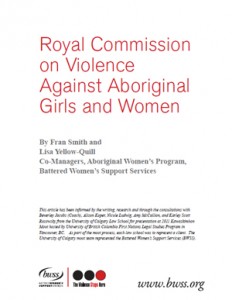
Apr 18, 2011 | Battered Women's Support Services
Inspiring Stories, Amazing Women, Ending Violence
By Angela Marie MacDougall
Think about Battered Women’s Support Services as concentric circles or a web of interconnected experiences, lives and stories steeped in survival, hope and effective change. At the centre are women who access our services, on a continuum of living with power and control including physical and sexual violence. Women who are seeking safety, living the complex reality of staying in an abusive relationship with the hope that “he will change”, leaving for a while, getting a taste of freedom and being pulled back by fear, societal pressures, systemic barriers, returning with the hope that “things will change”.
Throughout that process reaching out to lean on another through our support groups, our crisis line, our counselling, our legal advocacy, our workshops, our employment program, our specialized services and finding other women who are also finding a sense of personal power and empowerment. Who are living free of violence.
Statistically, women will stay, leave and return seven times before leaving for good, and some women never leave. As one 86 year old woman said, “if I had support like I have received at BWSS when I was younger I would have left a long time ago.”
Yes, all women of all ages, 14 – 86 who are dealing with power and control in their relationships including sexual and physical violence access BWSS. Each woman, or girl, with a painful journey of injustice and harm who are writing strength, survival and hope into their story through their contact with Battered Women’s Support Services, this year well over 8,000.
Women Who Volunteer
Women who volunteer with us who are also on a continuum who through their experiences have decided that they want to connect or reconnect with a community of women giving back to help other women find a way to live violence free. On Thursday, March 31, 2011, eight-six women attended our annual Volunteer Appreciation Event. Though we like to think we are demonstrating appreciation to women who volunteer with us every day, our annual event is the only time when all volunteers, staff and board members get together to acknowledge, recognize and celebrate.
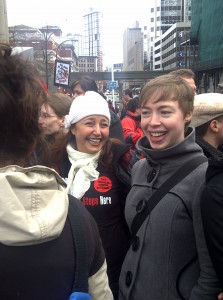
Women who volunteer at BWSS are a true reflection of our communities and tell the story of women’s survival and women’s liberation. This year was our biggest and best event ever. With the microphone open, women shared their stories of the connections, relationships and positive impact volunteering at BWSS has made in their lives and the impact they’ve been able to make in the lives of other women, children and men.
Staff Team
Our staff team, women who are committing their lives to the work of ending violence against women as a personal mission statement dovetailing with the mission of Battered Women’s Support Services. Indigenous women from Indigenous communities in Canada reaching out to Indigenous women living in the urban settings and on reserves linking the abuse in their intimate relationships to the very making of this nation as a nation and that personal safety is linked to Indigenous sovereignty. Recent Immigrant women delivering information, counselling, support groups in languages including Farsi, Punjabi and Spanish integrating critical cultural nuances that speak deeply and profoundly. BWSS Women counsellors working with women who are so impacted by lives filled with physical and sexual violence the trauma lives deep inside well after the abuser(s) have left assisting women unravel the experiences, piecing back together that which has been fractured, shattered…

Board Members
Our board members, strong women leaders, leading change in their respective professional and personal lives while lending their wisdom and guidance to the governance and strategic direction of Battered Women’s Support Services. Strong leadership growing authentically from years of experience ending violence in the diverse communities of women and feminist organizing.
Ending Violence
And the activism, BWSS staff, help women prepare, then accompany and successfully advocate for Refugee women to achieve refugee status, when after 20+ years of dismissing deaths of marginalized women (disproportionately Indigenous women) our staff who occupied the Vancouver Police department and said in no uncertain terms “enough is enough”, our staff who stand up to government policies like changes to Family Relations Act, restructuring of Bridging Employment programs, changes to immigration sponsorship that will disproportionally impact abused Immigrant women, proactively addressing bad practices in co-ed emergency shelters where women have been sexually assaulted, our staff who take the streets to stand up for women who are missing and who didn’t survive. And will do it again, in a moment’s notice.
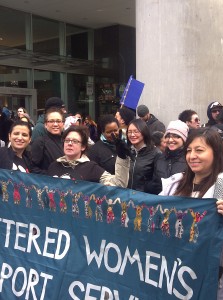
Each amazing woman with a story of overcoming, embracing and embodying survival and empowerment; grounding herself in her personal experience fueling her forward to effective change in her life, in her relationships, in her community and in the larger society, like ripples in a pond reaching our larger community regionally, provincially, nationally and internationally.
Our current issue of Women Making Waves is going to print; it has taken a while to get to this issue because we’ve been busy ending violence against girls and women. In this issue we celebrate our positive and effective change, inspiring stories, and all the amazing women who are ending violence.
Mar 20, 2011 | Reports
In the Fifty-fifth Session of the UN Commission on the Status of Women, it was agreed that although girls suffer severe gender discrimination and abuse, they remain “Crucial Constituents for Change”
Read more about this session’s conclusions, including the assertion that “more be done by States and communities to ensure stronger penalties for perpetrators and legal recourse for victims,” here.
Mar 10, 2011 | Battered Women's Support Services, Events
Battered Women’s Support Services will march in the International Day for the Elimination of Racism on Sunday, March 20th in downtown Vancouver-Coast Salish Territories. We will be marching alongside community members coming together to commemorate the struggle and strength of Indigenous and racialized people while we continue our fight against all forms of oppression.
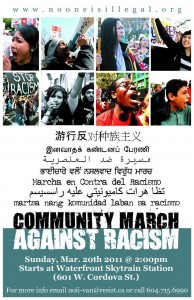
The march will begin from the Waterfront Skytrain Station at 2:00 pm.
For more information, click here.











